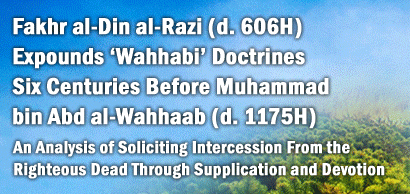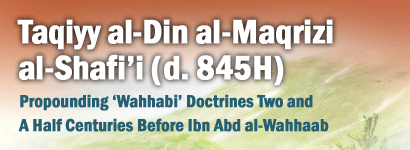| Tuesday, 30 December 2025 |
|
|
|
You are here:

You should be familar with everything that has preceded in previous parts to this series. Here they are:
In this article, we will provide a sample of fatawa from al-Izz bin Abd al-Salam (from his book "al-Fatawa" pictured right, Dar al-Ma'rifah, Beirut, 1406H) which will help to establish the following points: Firstly: That al-Izz bin Abd al-Salam's classification is simply a classification of whatever may enter into the linguistic meaning of bidah (anything which has no prior example and which may be praiseworthy or blameworthy). It is not intended as part of any justification or to be used as a principle for justification of innovation into matters of ibadah (worship) which are not from the Prophetic Sunnah in their foundations, or their details. Secondly: That al-Izz bin Abd al-Salam shows rejection against the bidah idafiyyah (that which has a foundation in the Shariah from one aspect, but opposes it from others) and encourages following the Sunnah and leaving that which opposes it, and that it is better to follow the Sunnah than to innovate. Thirdly: That the contemporary innovators who make use of the speech of al-Izz bin Abd al-Salam do injustice to him and twist his words in a way he did not intend them to be used. This can be seen when we look at the general spirit of avoiding and abandoning that which does not agree with the Sunnah or is not founded upon an authentic hadeeth which we see coming across in his fatawa. Fourthly: Whilst noting importantly that al-Izz was the first to speak of this classification which itself is innovated (as explained by al-Shatibee), and al-Shafi'i himself only spoke of bidah with its linguistic meaning and mentioned it can be blameworthy (what the Shariah intends) or praiseworthy (what enters into matters of public interest or itself has a specific precedence in the Sunnah).
1st Example: In this first example note how al-Izz is asked about two matters. One that relate to an issue legislated and permitted in the Shariah (shaking hands), and one that relates directly to a matter of worship (raising hands in du'a). There occurs in the book al-Fatawa (pp. 46-47):
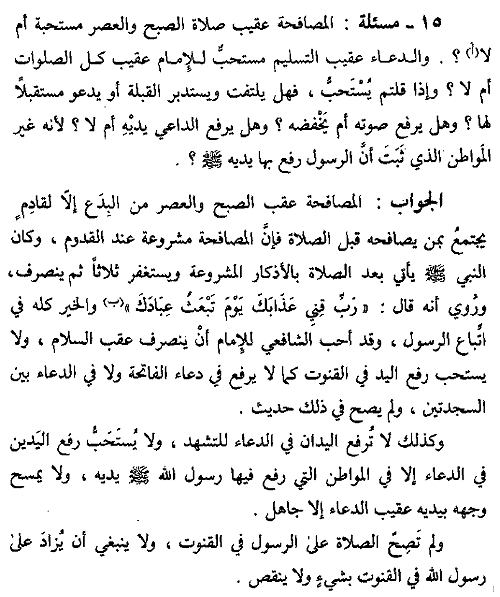
Note how he says that shaking hands after fajr and asr prayers is from the innovations, alongside our knowledge that he included them within the innovations which are mubah (permitted) elsewhere. He states that this practice is from the innovations unless it is between two people whose intent it is to meet, and then when the prayer finishes they shake hands, meaning that this would take it out of being from the innovations, since shaking hands when meeting someone who arrives is a legislated matter. So he distinguished between the two situations Then he said (speaking about a matter related directly to worship):
In relation to what is part and parcel of an act of worship we see here that al-Izz mentions all goodness lies in following the Messenger (alayhis salaam) and that one should not add anything into the qunut above what the Messenger used to say, and he mentions that hands should only be raised in those instances in which the Messenger used to raise them. What we are seeing here, as we said, is a general type of spirit regarding matters of worship which is very different to other matters. 2nd Example: The next question is about making mention the Companions in the sermons which is something the Salaf never did. This occurs in the book al-Fatawa (pp. 47-48):
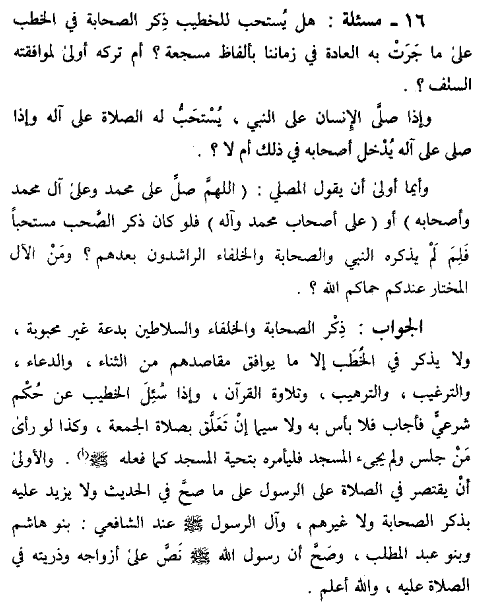
From this we can see that what the innovators claim that "Whatever has a basis in the Shariah is not considered the disliked and reprehensible innovation, but is good innovation (bidah hasanah)" is not upon what the Scholars intend. In this example one can argue that remembering the Companions and praising them and respecting them has a basis in the Shariah, and hence to mention them in the sermons is nothing but a bidah hasanah which the Shariah permits. In his answer he clearly states that mentioning the Companions, the rightly-guided caliphs and the rulers is an undesirable innovation, and that only certain things ought be in a sermon (which fulfils the goals and objectives of the sermon). He states that is more befitting that a person only sends prayers upon the Messenger (alayhis salaam) in the manner that is authentically related in the ahaadeeth, and not to add anything further to it. We see here something different to what the innovators argue about "bidah hasanah" which is that if something has a supportor basis in the Shariah then it is a good innovation, not a bad innovation. Applying that argument here would be that mentioning and praising the Companions has a basis in the Shariah (no disagreement there), and since it has a basis in the Shariah, if we were to mention them in the sermons this would be a good bidah (here they have taken something which has a foundation in the Shariah and then altered its form with respect to how it is done). However, we do not see al-Izz bin Abd al-Salam allowing this, and it is clear that he considers this from the undesirable innovations. Again, if you go back and have a look at what al-Izz bin Abd al-Salam includes as examples within his classifications of bidahs that are wajib (obligatory), mandub (recommended) and mubah (permitted), you will clearly see that he intends something different to what the innovators intend by wrongly using his classification to justify innovating into the deen of Allaah that which is not from it. So our point here is that we clearly see a different type of spirit from al-Izz bin Abd al-Salam to what we see from the innovators. 3rd Example: This next issue is about whether using a bright prayer mat is disliked when one can pray on a normal mat or on the earth, following the Salaf in that. Also when one is absolutely certain that the prayer mat is clean and one is not certain whether the mat in the mosque is pure, is it better to pray on the prayer mat or not, and is it required upon him to know with certainty if the mat in the mosque is pure or not? This is in al-Fatawa (pp. 68-69):
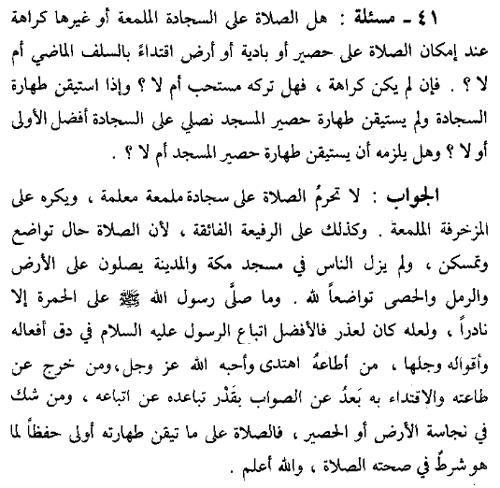 The answer is as follows:
We see here that despite what we know of al-Izz's classification into bidah into the five Shariah rulings, he still emphasizes sticking to the way of the Prophet (alayhis salaam) in all matters, large or small, and that when it comes to matters of worship, he clearly entices sticking to the Sunnah and avoiding what opposes it, either in its foundations, or in its particular details. 4th Example: There occurs in the book al-Fatawa (pp. 69-70):
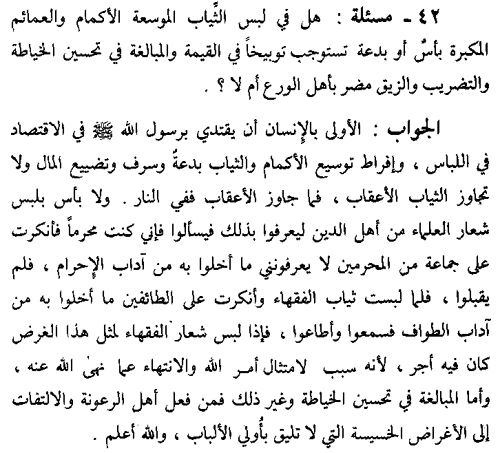
Note again how he encourages sticking to the Sunnah and seeking guidance by the way of the Messenger (sallallaahu alayhi wasallam) even in matters not directly connected to worship, in this case, widening the sleeves and other such matters, going to excesses in that regard, alongside our knowledge that he actually considers the widening of the sleeves to be an innovation (in the linguistic sense) that is permitted. Once more, we see a general spirit in his answers which indicates the opposition to innovations and enticing sticking to the way of the Messenger (alayhis salaam), even in matters in which he considers elsewhere to be permitted innovations. 5th Example: There occurs in the book al-Fatawa (p. 100):
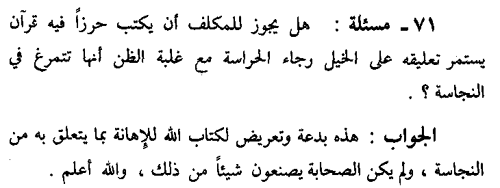
Upon the argument of the innovators, one would say that since the Qur'an is known to be a protection, which indeed is a foundation and a basis clearly established in the religion, then one could write it on paper as an amulet with the aim of applying its protective effect to one's animals (livestock or horses). So this would be a "good innovation (bidah hasanah)", because it is being based on something which has a foundation. But we see again an answer from al-Izz, mentioning it in a blameworthy way (as a bidah), in addition to it being a means of subjecting the Qu'ran to belittlement. 6th Example: There occurs in the book al-Fatawa (pp. 172-173):
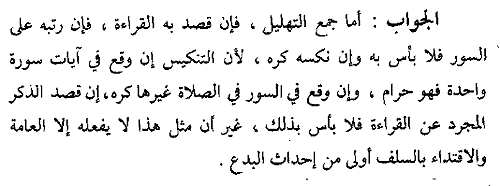 This question is about a man who compiles together all the verses in the Qur'an which contain "laa ilaaha illallaah" and then reads them as he would a surah.
This again is clear, note his final remark, and we hardly need to comment on that, and when he says that guiding oneself by the Salaf is more worthy than introducing innovations, he means here innovation (bidah) in worship (ibaadah), and is not speaking about bidah in its general, broad linguistic sense. This indicates to us that the particular perception and understanding in the mind of al-Izz bin Abd al-Salam, is not the same as those innovators of today who try to employ his statement (of classification of bidah into wajib, mandub and mubah) in a way he did not intend at all. Summing Up At this point it is worthy that we make sure you understand where we are going here:
Firstly, al-Izz bin Abd al-Salam is an Ash'ari Sufi, upon the creed of the Jahmiyyah in Sifat, and he innovated a five-fold classification of bidah (upon its linguistic sense) rejected by the clear-cut statements of the Messenger (alayhis salaam), and the Companions, who spoke only of bidah in its Shariah sense, and declared that all bidah (in the Shariah sense) is misguidance. But that classification by al-Izz has been used by the innovators to justify their heretical innovations in worship. We are now ready for Part 6 inshaa'Allaah.
Link to this article: Show: HTML Link • Full Link • Short Link
Related Articles:
You must be registered and logged in to comment. |
|
||||||||||||||||
 |
 | |
|
|
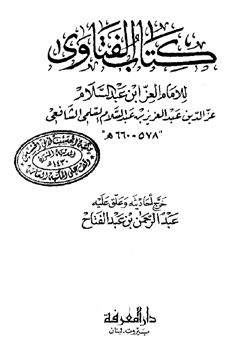 In the
In the  The Issue:
The Issue: 







